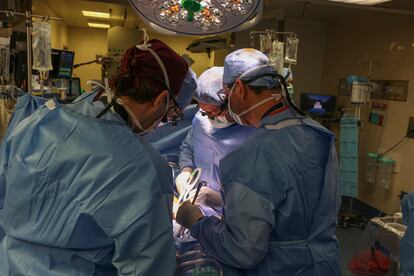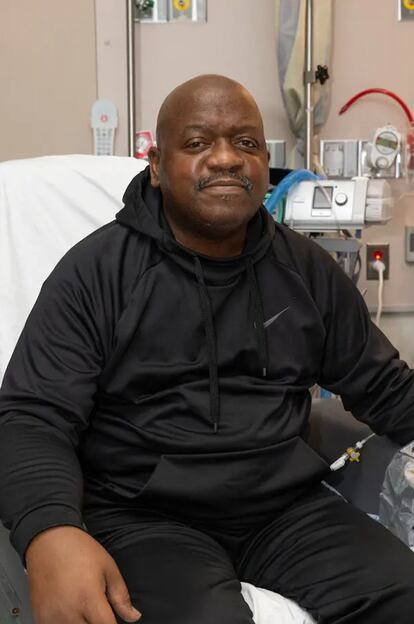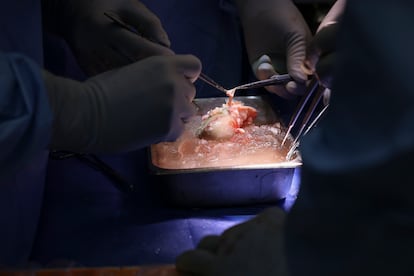First patient to receive a genetically modified pig kidney is discharged
Rick Slayman was sent home from Massachusetts General Hospital after a procedure that marks a milestone in the emerging field of xenotransplantation


Rick Slayman, the first living recipient of a genetically edited pig kidney transplant, was discharged from Massachusetts General Hospital on Wednesday, two weeks after the operation. “This moment — leaving the hospital today with one of the cleanest bills of health I’ve had in a long time — is one I wished would come for many years. Now, it’s a reality and one of the happiest moments of my life,” said the 62-year-old patient in a statement released by the hospital.
Slayman is the third person to receive a genetically modified pig organ. The previous two died shortly after their transplants. David Bennett lived for two months with a genetically altered pig heart and died in March 2022. Lawrence Faucette, 58, died last November after a similar transplant in September. Both suffered from a terminal heart condition and both underwent surgery at the University of Maryland Medical Center in Baltimore.
In Slayman’s case, no symptoms of rejection have been observed and the organ is carrying out renal functions, according to the doctors. “I’m excited to resume spending time with my family, friends, and loved ones free from the burden of dialysis that has affected my quality of life for many years,” Slayman said in his statement. “Lastly, I want to thank anyone who has seen my story and sent well-wishes, especially patients waiting for a kidney transplant. Today marks a new beginning not just for me, but for them, as well. My recovery is progressing smoothly and I ask for privacy at this time.”

Slayman, who has suffered from type 2 diabetes and hypertension for many years, previously received a kidney transplant from a deceased human donor in December 2018, after having been on dialysis for seven years. The transplanted kidney showed signs of failure approximately five years later and the patient resumed dialysis in May 2023. Since resuming dialysis, he encountered recurrent dialysis vascular access complications requiring visits to the hospital every two weeks for de-clotting and surgical revisions, significantly impacting his quality of life, which is a common problem among dialysis patients, the hospital explained in a statement.
Gene editing
Massachusetts General Hospital, a founding member of the Mass General Brigham health system, announced in mid-March the world’s first successful transplant of a genetically edited pig kidney to a man with end-stage kidney disease. The four-hour procedure was carried out on Saturday, March 16. The Mass General Brigham system has a history of organ transplant innovation, including the world’s first successful human organ (kidney) transplant performed at Brigham and Women’s Hospital in 1954.
The porcine kidney was supplied by eGenesis, a Cambridge (Massachusetts) firm, from a porcine donor that was genetically modified using CRISPR-Cas9 technology to eliminate harmful porcine genes and add certain human genes to improve its compatibility with humans. Additionally, the scientists inactivated endogenous porcine retroviruses in the donor pig to eliminate any risk of infection in humans, the hospital statement explained.

The transplantation of organs from genetically modified animals opens an era of possibilities and risks in medicine. It is hoped that the shortage of human organs can be partially made up for with xenotransplantation — an emerging field that focuses on the transplantation of organs or tissues from one species to another.
According to the United Network for Organ Sharing (UNOS), more than 100,000 people in the U.S. await an organ for transplant and 17 people die each day waiting for an organ. A kidney is the most common organ needed for transplant, and end-stage kidney disease rates are estimated to increase 29-68% in the U.S. by 2030, according to literature published in the Journal of the American Society of Nephrology.
Sign up for our weekly newsletter to get more English-language news coverage from EL PAÍS USA Edition
Tu suscripción se está usando en otro dispositivo
¿Quieres añadir otro usuario a tu suscripción?
Si continúas leyendo en este dispositivo, no se podrá leer en el otro.
FlechaTu suscripción se está usando en otro dispositivo y solo puedes acceder a EL PAÍS desde un dispositivo a la vez.
Si quieres compartir tu cuenta, cambia tu suscripción a la modalidad Premium, así podrás añadir otro usuario. Cada uno accederá con su propia cuenta de email, lo que os permitirá personalizar vuestra experiencia en EL PAÍS.
¿Tienes una suscripción de empresa? Accede aquí para contratar más cuentas.
En el caso de no saber quién está usando tu cuenta, te recomendamos cambiar tu contraseña aquí.
Si decides continuar compartiendo tu cuenta, este mensaje se mostrará en tu dispositivo y en el de la otra persona que está usando tu cuenta de forma indefinida, afectando a tu experiencia de lectura. Puedes consultar aquí los términos y condiciones de la suscripción digital.








































